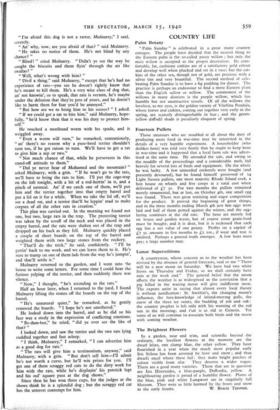Fourteen Pullets Those amateurs who are troubled at all about
the duty of producing more food in war-time may be interested in the details of a very humble experiment. A householder (who dislikes hens) was told very firmly that he ought to keep hens in war-time and it happened that a local farm sale was adver- tised at the same time. He attended the sale, and owing to the muddle of the proceedings and a considerable mob, bid bravely for several lots of birds and equipment. On the whole he was lucky. A few unneeded cockerels were bought (and presently devoured), but he found himself possessed of 54 Light Sussex pullets, one most majestic Rhode Island cock, a hen house on wheels and five coops at a total cost when delivered of £7 5s. For two months the pullets remained merely ornamental, but at last, on October 4th, one small egg was found. There was great rejoicing and eager competition for the product. It proved the beginning of great things, and in the three months ending March 4th just boo eggs were laid and half of them potted against the winter, and the egg- laying continues at the old rate. The hens are merely fed on house and garden waste, but of course some grain-food must be bought; and it is dear, but it is reckoned that each egg has a net value of one penny. Profits on a capital of £7 5s. amount in five months to £2 los., if wear and tear is omitted. Perhaps a general truth emerges. A few hens must pay; a large number may.






















































 Previous page
Previous page